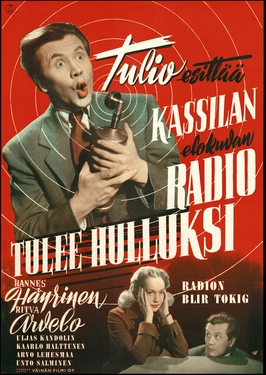Related Research Articles

Toini Gustafsson Rönnlund is a Swedish former cross-country skier. She competed in the 1964 and 1968 Winter Olympics and won four medals. Gustafsson also won the 10 km race at the Holmenkollen ski festival in each of 1960, 1967, and 1968. At the FIS Nordic World Ski Championships she collected three medals with a silver in 1962 and two bronzes in 1966.

Outi Mäenpää is a Finnish actress.

Theodor Antonius Tugai, better known as Teuvo Tulio, was a Finnish film director and actor. Beginning his career as an actor at the end of the silent era, Tulio turned to directing and producing in the 1930s. His films are noted for their extremely melodramatic style.

The Radio Goes Insane or The Radio Goes Mad is a 1952 Finnish comedy film directed by Matti Kassila. The film is a sequel to The Radio Burglary, again starring Hannes Häyrinen as radio reporter Toivo Teräsvuori. Teräsvuori is mistakenly committed to a mental hospital and attempts to escape.

Black Ice is a 2007 Finnish drama film written and directed by Petri Kotwica. Produced as a Finnish-German joint production, it stars actors Outi Mäenpää, Martti Suosalo and Ria Kataja in a twisted love triangle.

Linnaisten vihreä kamari is a 1945 Finnish film directed by Valentin Vaala. Mixing elements of horror and romance, it is based on an 1859 novel The Green Chamber of the Linnainen Mansion by Zachris Topelius.

Axa Regina Elisabeth Linnanheimo was a Finnish actress and screenwriter. Her sister Rakel Linnanheimo (1908–2004) was also an actress. Linnanheimo was married to Count Carl Robert Mörner 1948–1952, until his death. After she ended her film career in 1956, she started to work as a translator for the Finnish Broadcasting Company using the name Regina Mörner.
Lea Ruth Margit Joutseno was a Finnish actress, screenwriter and a translator. She became known as a blonde comedian in the 1940s after appearing in several Valentin Vaala's films. Along with Helena Kara and Regina Linnanheimo, Joutseno was one of the few Finnish film stars who did not have a theatrical background.

Aini Helena Kara was a Finnish film actress. Like Lea Joutseno and Regina Linnanheimo, she was one of the few Finnish film actors without a theatrical background. Kara is best remembered for her role in a 1943 melodrama Valkoiset ruusut.
Two Funny Guys is a 1953 Finnish comedy film directed by Lasse Pöysti and starring Pöysti, Toini Vartiainen and Pentti Viljanen.
Jealousy is a 1953 Finnish drama film directed by Teuvo Tulio and starring Regina Linnanheimo, Eero Paganus and Assi Raine. It was a remake of Restless Blood (1946). The film was shot in parallel with the Swedish-language version Två kvinnor.

Substitute Wife is a 1936 Finnish romantic comedy film directed by Valentin Vaala and starring Ansa Ikonen, Tauno Palo and Uuno Laakso.

Cross of Love is a 1946 Finnish drama film directed by Teuvo Tulio and starring Regina Linnanheimo, Oscar Tengström and Ville Salminen. It is based on the short story "The Stationmaster" by Alexander Pushkin. The film was shot in parallel with the Swedish-language version Kärlekens kors.
Ellen "Elli" Johanna Ylimaa, née Linnanheimo (1900–1982) was a Finnish stage and film actress. She was the sister of the actress Regina Linnanheimo.

Matti Kaleva Kekkonen was a Finnish politician and jurist, son of president Urho Kekkonen and author Sylvi Kekkonen.

The Song of the Blood-Red Flower is a 1971 Finnish romance and drama film, and the fifth adaptation of Johannes Linnankoski's 1905 novel of the same name. Film tells the story of a glib log driver Olof Koskela, who keeps sowing his wild oats, and when the time comes for him to settle down he finds it difficult to trust anyone in view of his fickle past. Film is directed by Mikko Niskanen and it stars Pertti Melasniemi, Marjukka Arasola, Aune Hurme-Virtanen, Anna-Maija Kokkinen, and Marjatta Pasanen as Kyllikki Moisio. The film is the only color film ever made on the basis of the novel.

The Song of the Scarlet Flower is a 1938 Finnish romance and drama film. It is based on the novel The Song of the Blood-Red Flower by Johannes Linnankoski, telling the story of a glib log driver Olavi Koskela, who spends his free time flirting with young maids. Film is directed by Teuvo Tulio and it stars Kaarlo Oksanen, Rakel Linnanheimo, Mirjami Kuosmanen, Nora Mäkinen, Birgit Nuotio and Maire Ranius. The film was the first Finnish adaptation of the book, with the two previous adaptations being Swedish.
Olof – forsfararen is a 1947 Swedish-language Finnish drama film directed by Teuvo Tulio and starring Regina Linnanheimo, Kullervo Kalske and Eric Gustafson. The film was shot in parallel with the Finnish-language version Intohimon vallassa.
Oroligt blod is a 1946 Swedish-language Finnish drama film directed by Teuvo Tulio and starring Regina Linnanheimo, Harriett Philipson and Hans Strååt. The film was shot in parallel with the Finnish-language version Levoton veri.
Vihtori ja Klaara is a 1939 Finnish comedy film. It was the only comedy film directed by Teuvo Tulio and his second oldest film to survive in its entirety. The film tells the story about Vihtori's henpecked life with his temperamental wife Klaara. This farcical marriage story is punctuated with numerous misunderstandings.
References
- ↑ Kääpä p.41